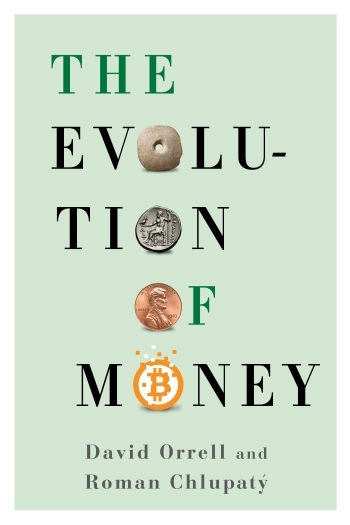A Media Roundup for "The Evolution of Money"
“The reason I think we need a new theory of money is because traditional theories either emphasise one side of money only (such as bullionism vs chartalism) or more or less ignore its properties altogether (like mainstream economics). And they take the relationship with number for granted, which I think is a mistake. It is the most obvious feature of money, and in many ways the most important.” — David Orrell
This week, our featured book is The Evolution of Money, by David Orrell and Roman Chlupatý. For our final post of the week, we’ve collected a number of the best articles and interviews by and about David Orrell, Roman Chlupatý, and The Evolution of Money.
First, you can read an adapted excerpt from The Evolution of Money at Evonomics:
Environmental conflict is therefore hardwired into the design of our monetary system—built for funding wars with kings and empires and now, as Klein documents, with the planet (one that, if it continues, the planet will win—it’s bigger). Dazzling us with number, it distracts us from the costs. This, rather than ideology, is why the GDP produced in a city like Beijing is booming, but people are leaving because they can’t breathe the air (and why, a little late, the National Congress of the Communist Party wrote the goal of an “ecological civilization” into its constitution in 2012). Like a toxic algal bloom on a lake, the economy is doing fine, but it is asphyxiating everything around it.
99Bitcoins has a great interview with David Orrell on cryptocurrency:
“The reason I think we need a new theory of money is because traditional theories either emphasise one side of money only (such as bullionism vs chartalism) or more or less ignore its properties altogether (like mainstream economics). And they take the relationship with number for granted, which I think is a mistake. It is the most obvious feature of money, and in many ways the most important.” — David Orrell
Adbusters featured “The True Value of Money,” an article by David Orrell:
A peculiar feature of orthodox economics is that money is treated as an inert medium of exchange, with no special properties of its own. As a result, money is largely excluded from macroeconomic models, which is one reason the financial crisis of 2007/8 was not predicted (it involved money). In many respects, when viewed through the lens of quantum physics, money behaves a lot like matter – and acknowledging that behavior promises to do to economics what quanta did for physics.
Roman Chlupatý explains why money is undermining our financial system in an interview with euronews:
“And this is exactly where the current problem lies: central banks – and their peers, commercial banks – still operate in a one-dimensional universe where readiness to spend has been muted. On the one hand, we now have those who have, who are thus trustworthy and who can therefore reach into the honeypot of cheap credit. But these largely own what they want and who instead of spending on things invest – thus the asset bubble and also the increasing gap between rich and poor. On the other, we have those who want to spend but don’t have the means or access to credit.” — Roman Chlupatý
David Orrell takes on the question of bitcoin and cybercurrency in “A Quantum Theory of Money and Value,” which appeared in Bitcoin Magazine:
A cybercurrency is supported not by metal or the state, but by something much more distributed and amorphous – its network of users. A property of networks is that their power expands rapidly with size. The value of a cybercurrency therefore grows in the same way with the size of the network of users, so can initially be near-zero. It is not necessary to begin with an external debt or a source of value, because the two can expand together.
Watch David Orrell deliver “Money Is the Message,” the Marshall McLuhan Lecture 2015:
Watch David Orrell speak at TEDxParkKultury on “Forecasting in the Past, Present, and Future”:
Finally, you can keep up with more on the evolution and future of money on David Orell’s blog, The Future of Everything.




